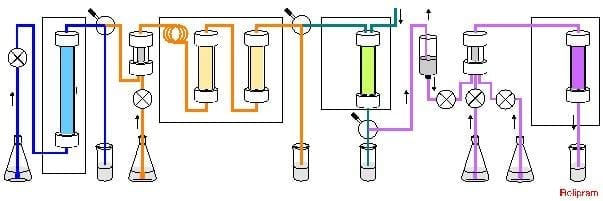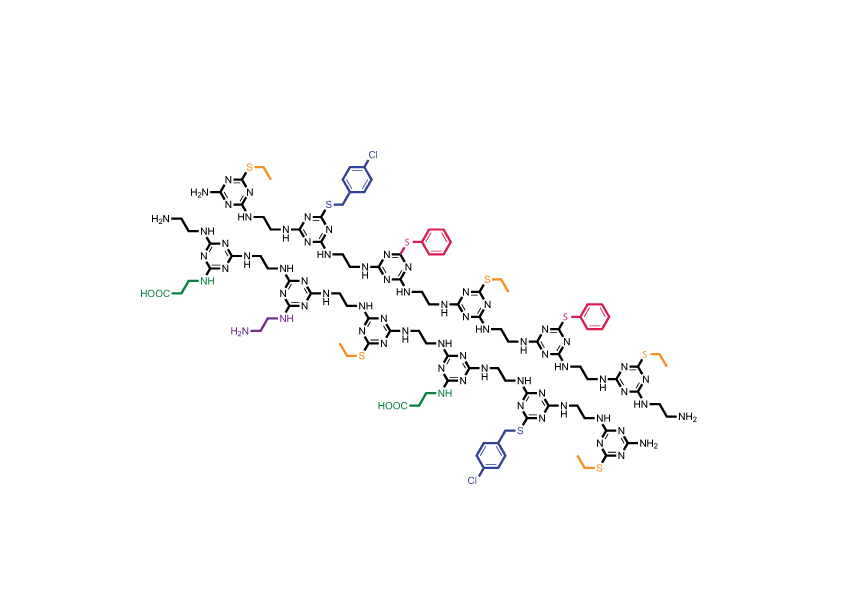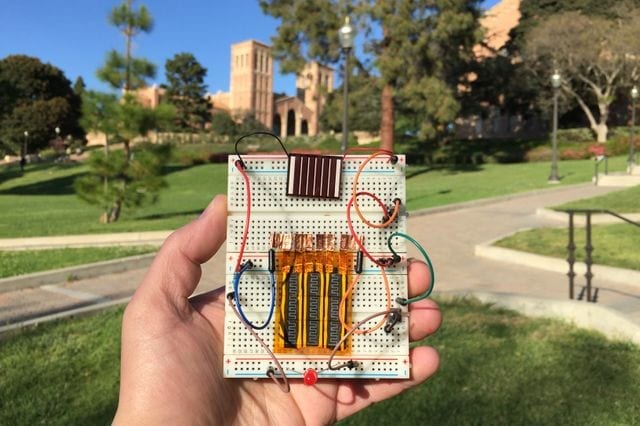
Direct continuous synthesis of medicines becomes possible
A University of Tokyo research group has succeeded in synthesizing (R)- and (S)-rolipram, the active component of a medicine, in high yield with high selectivity by an innovative catalyzed flow fine synthesis instead of the traditional batch method used in the production of 99% of medicines.
Professor Shu Kobayashi’s group at the Graduate School of Science has developed highly active immobilized catalysts (heterogeneous catalysts) and demonstrated simple and highly efficient synthesis of (R)- and (S)-rolipram by an eight-step continuous flow reaction using multiple column reactors containing the immobilized catalysts.
Currently, the active components of medicines as well as other fine chemicals are synthesized by a repeated batch reaction method, in which all starting materials are mixed in reaction vessels and the desired compounds are extracted after the all reactions have finished. In this method excess energy and operational steps are needed and a significant amount of waste is generated.
Read more: New synthetic technology for medicines and fine chemicals
The Latest on: Synthetic technology
[google_news title=”” keyword=”Synthetic technology” num_posts=”10″ blurb_length=”0″ show_thumb=”left”]
via Google News
The Latest on: Synthetic technology
- Valvoline Full Synthetic High Mileage with MaxLife Technology SAE 5W-30 Motor Oil 5 QT, Now 25% Offon April 27, 2024 at 9:02 am
With all these reasons, it's clear that the Valvoline Full Synthetic High Mileage with MaxLife Technology SAE 5W-30 Motor Oil 5 QT is an excellent investment for any high mileage car owner. Catch this ...
- Synthetic droplets cause a stir in the primordial soup: Chemotaxis research answers questions about biological movementon April 25, 2024 at 7:14 am
Our bodies are made up of trillions of different cells, each fulfilling their own unique function to keep us alive. How do cells move around inside these extremely complicated systems? How do they ...
- Watch: Tech Makes People Dance in 'Synthetic Pleasures' Short Filmon April 24, 2024 at 5:00 pm
Is it technology setting us free, or are we freeing ourselves from technology? Nowadays the latter seems more important. This experimental short film titled Synthetic Pleasures is the creation of ...
- An AI startup made a hyperrealistic deepfake of me that’s so good it’s scaryon April 24, 2024 at 5:00 pm
I joke that Oshinyemi has what MIT Technology Review might call a job title of the future: “deepfake creation director.” “We like the term ‘synthetic media’ as opposed to ‘deepfake ...
- Synthetic Reality Can Generate Worlds and Drive Innovative Solutionson April 24, 2024 at 6:30 am
What is a synthetic reality and what are Deepfakes? Discover more about the good and bad of the emergence of synthetic realities.
- Synthetic Biology – Webinars and Online Eventson April 24, 2024 at 3:51 am
This one-day online event will feature short talks covering recent innovations in research and technology in the cell and gene therapy ... Here, Dr. Riglar will discuss ways that we are using ...
- Beyond biology: Creating dynamic synthetic cells with programmable DNAon April 22, 2024 at 4:59 pm
"This research helps us understand what makes life," Freeman says. "This synthetic cell technology will not just enable us to reproduce what nature does, but also make materials that surpass biology." ...
- Hyalex Orthopaedics announces first cases with synthetic knee cartilage implanton April 22, 2024 at 11:43 am
Hyalex Orthopaedics announced today that patients successfully received Hyalex knee implants as part of its first-in-human clinical trials.
- Safeguarding the Retail Industry From Synthetic ID Fraudon April 17, 2024 at 11:58 am
As the retail landscape continues to evolve, the fight against synthetic identity fraud must remain a top priority for the industry.
- Synthetic Data Can Bring Real Change to Graphic Designon April 15, 2024 at 10:09 pm
The graphic design software segment is lately in the midst of a small revolution, fuelled by both failed and successful efforts of consolidation, as well as growing interest spurred by the ...
via Bing News










